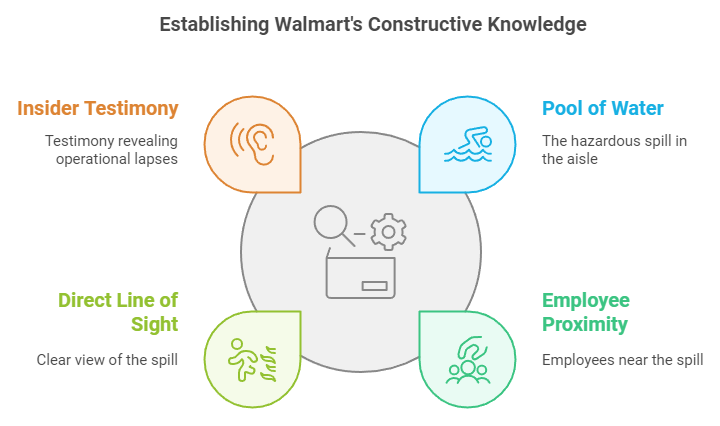This analysis dives into a specific slip and fall case involving Walmart in Stafford, Texas. We’ll peel back the layers of legal jargon to illuminate the steps you can take if you ever find yourself in a similar situation, demonstrating that there are legal solutions available through expert legal guidance, like that offered by Joe I. Zaid & Associates.
The Incident at Walmart in Stafford, Texas
Imagine walking into a Walmart in Stafford, Texas, looking for groceries or daily essentials, and then unexpectedly finding yourself on the ground, injured and confused. This is exactly what happened to Courtney Casey on September 12, 2019, while shopping in the meat section of a Walmart store. As Courtney made her way through the aisle, she suddenly slipped and fell on a wet floor, leading to her sustaining serious bodily injuries. This slip and fall accident sparked a legal battle focused on whether Walmart bore responsibility for the accident due to negligence or premises liability.
Courtney Casey’s legal team filed a lawsuit invoking Texas premises liability law, aiming to hold Walmart accountable for failing to maintain a safe environment for customers. In such cases, the plaintiff must show that the property owner (Walmart, in this case) either knew, or should have known, about the dangerous condition that caused the injury.
The Legal Framework
The duties of a property owner in Texas regarding the safety of their premises largely depend on the visitor’s status at the time of the accident. In this instance, Courtney Casey was considered an “invitee” because she was on Walmart’s premises for mutual benefit with the store. Texans seek Walmart for an array of products and naturally expect the environment to be reasonably safe. This legal status implies that Walmart had a duty to use reasonable care to protect Casey from any hazards that were present and pose risks within the store.
The law differentiates between ordinary negligence and premises liability. Ordinary negligence usually pertains to ongoing customer activities while premises liability relates to injury-causing conditions present on the property. For slip and fall cases, premises liability is the applicable legal standard. Casey was tasked to prove four main elements: Walmart had knowledge of the dangerous condition, the condition posed unreasonable harm, the store failed to address the hazard adequately, and that failure led directly to her injuries.
A critical point of the case hinged on whether Walmart had “actual or constructive knowledge” of the wet floor. Actual knowledge means Walmart must have been aware of the condition before the fall. Constructive knowledge, on the other hand, asks whether the condition existed for a long enough time that Walmart should have known about it. These elements are essential in establishing a property owner’s liability.
Gathering Evidence
Let’s dig deeper into how Courtney Casey’s case demonstrated Walmart’s constructive knowledge. During her visit to Walmart in Stafford, Casey noted a pool of dark, cloudy water, seeping from a meat cooler that spilled into the aisle. Multiple employees were nearby, presumably in positions that might have made it possible to see and rectify the hazardous condition. Such a circumstance calls into question Walmart’s protocol for identifying and mitigating risks on their sales floors.
Casey’s legal team pointed to the fact that employees were within proximity and had a direct line of sight, arguing that given the duration and conspicuousness of the spill, Walmart had reasonable opportunity to discover and alleviate the danger before the accident occurred. At trial, one senior Walmart employee, Thanh Tran, reviewed photographs and testified that the water likely had been on the floor for some time and store policies regarding spills may not have been correctly adhered to.
This insider testimony was crucial to establishing Walmart’s constructive knowledge of the condition, as experienced workers can offer insights into operational lapses within large retail environments, like those existing in Stafford, Texas.
The Court’s Decision and Its Implications
Ultimately, the court found that there was indeed a genuine issue of material fact related to Walmart’s potential constructive knowledge of the puddle in which Casey slipped. Thus, Walmart’s motion for summary judgment—which would have dismissed the case without a full trial—was denied, meaning that a jury must ultimately decide whether Walmart had sufficient knowledge of the spill and if their inaction directly caused Casey’s injuries.
This case underscores the intricacies involved in premises liability claims. It exemplifies the importance of thorough preparation, from collecting solid evidence to securing credible testimony, to have a shot at succeeding against large entities like Walmart.
Seeking Legal Help
If you or someone close to you experiences an injury like the one in this Stafford, Texas, Walmart, it’s pivotal to know your rights. Engaging experienced legal professionals can markedly increase your odds of securing the compensation you deserve.
Joe I. Zaid & Associates, a personal injury law firm located at 4701 Preston Ave, Pasadena, TX 77505, specializes in premises liability cases such as slip and falls at major retailers.
With a track record of handling cases similar to this Stafford, Texas incident, their expertise could be invaluable in guiding you through the legal process and advocating for your rights.
Conclusion
This case highlights the significance of premises liability in holding property owners accountable for potentially dangerous conditions that cause harm to patrons. Understanding the legal nuances and securing expert legal counsel can improve your chances of achieving a favorable outcome. If you’ve been hurt or wronged similarly, seeking assistance from Joe I. Zaid & Associates might be your next best step toward resolution.
Disclaimer: This article is a analysis based on a real case retrieved from casetext.com and does not pertain to any specific case handled by Joe I. Zaid & Associates. Each case is unique and should be independently reviewed by legal professionals.


